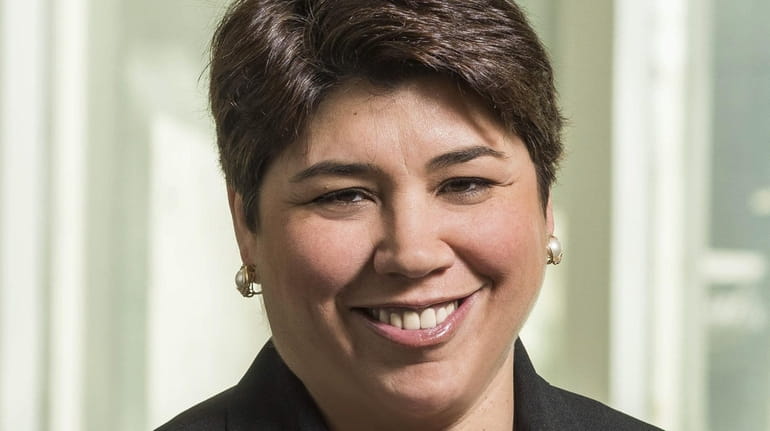EEOC says workplace discrimination charges down

Domenique Camacho Moran, a partner at Farrell Fritz in Uniondale, says training and good performance management can help prevent discrimination claims. Credit: Jim Lennon Photography
Workplace harassment has been a hot topic over the past few years.
Subsequently, employers are being held more accountable, which may be contributing in part to a decline in overall workplace discrimination charges, say experts.
According to the latest stats from the U.S. Equal Employment Opportunity Commission (EEOC), workplace discrimination charges filed with the EEOC declined from 76,418 in fiscal year 2018 to 72,675 in fiscal year 2019.
“The data is heading in the right direction,” says Aoifa O’Donnell, CEO of National EAP, a Hauppauge-based company that provides employee assistance programs, corporate training and leadership coaching services.
In particular, charges alleging sexual harassment were down from 7,609 in fiscal year 2018 to 7,514 in fiscal year 2019.
This could be attributed in part to “the #MeToo movement and heightened awareness around inappropriate conduct,” says O’Donnell.
Still, there’s more work to be done. Two areas that saw increased charges were those alleging color discrimination and charges related to Equal Pay Act violations.
When asked why those numbers might be up, EEOC spokesman James Ryan said: "The EEOC generally declines to give possible reasons for any type of discrimination charge going up or down in a certain area or during a certain time period. The possible causes for such developments are open to interpretation and/or speculation.”
He added: “One may speculate on 'reasons' for discrimination . . . but there is never any excuse for it.”
According to EEOC data, retaliation continued to be the most frequently filed charge, representing 53.8% of all charges filed.
Retaliation is claimed when an employee feels they were treated less favorably after engaging in a protected activity such as reporting discrimination or participating in a discrimination investigation, says Jonathan Bruno, a partner in the Manhattan office of Rivkin Radler LLP.
The reason these charges tend to be higher is “retaliation is much easier to prove then discrimination,” he says, adding that’s because retaliation “may be inferred when an adverse employment action happened in close proximity to the employee engaging in a protected activity.”
With that in mind, employers need to take “some pause” before terminating/disciplining an employee especially if the employee is engaged in a protected activity such as complaining about their work environment or requesting some type of leave, says Bruno. Also they need to document employee performance issues in a timely and thorough manner, he says.
Barbara DeMatteo, director of HR consulting at Jericho-based Portnoy, Messinger, Pearl & Associates, agrees, noting that when a client asks for advice to fire someone, she asks if the employee has filed any complaint, taken a leave of absence or participated in an investigation.
Employers must objectively consider why a negative action is being taken, she says.
The overall decline in discrimination charges is encouraging, she said, but may not tell the whole picture considering there are a lot of unreported complaints filed internally at companies.
Still, it’s good to see sexual harassment charges down, she said, noting it may be attributed to heightened awareness of the issue.
In New York, sexual harassment training is now mandated annually, which has led to increased training requests, she says.
“We very clearly saw an uptick in the last quarter of 2019, especially because of the NYS requirement,” says DeMatteo.
O’Donnell says employers that had never conducted this training before are using New York’s “training mandate as an opportunity to educate employees about all protected classes and increase respect.”
In New York, total workplace discrimination charges filed with the EEOC declined from 3,478 in fiscal year 2018 to 3,220 in fiscal year 2019, says Domenique Camacho Moran, a partner at Farrell Fritz in Uniondale.
Sex-based charges, which includes sexual harassment charges, declined from 1,299 in fiscal year 2018 to 1,209 in fiscal year 2019, she says.
Still she says it may be too soon to tell if that downward trend will continue.
“The charges are only one piece of the story,” says Moran.
It will be more telling to see how claims are ultimately resolved in federal and state court (i.e., whether they are dismissed, whether they go to trial and if the employee receives any monetary settlement), she says.
She says training and good performance management can help prevent claims.
Moran advises companies to look at five-year training windows, trying to differentiate the training each year so it doesn’t become stale (i.e. alternate live training, webinars, etc).
The key is making it more than a mandate, but part of company culture.
“It behooves employers to prioritize creating healthy and positive workplace cultures as they are the driving force to an engaged workforce, essential for long-term business success,” says O’Donnell.
Top 5 charges filed with EEOC in fiscal year 2019
• Retaliation: 39,110 (53.8% of all charges filed)
• Disability: 24,238 (33.4%)
• Race: 23,976 (33.0%)
• Sex: 23,532 (32.4%)
• Age: 15,573 (21.4%)
Source: EEOC
Updated 1 minute ago Brush fire at Lakeland Park ... Offshore wind projects cancelled ... Pitbull at Jones Beach ... Jericho H.S. ranks top
